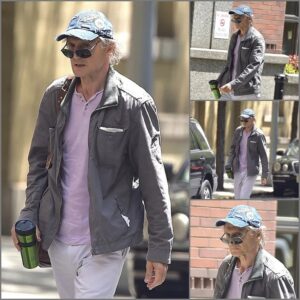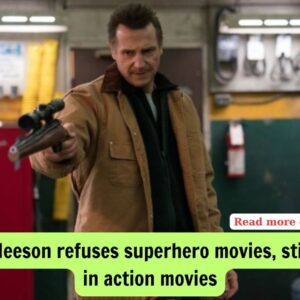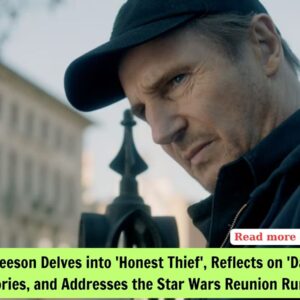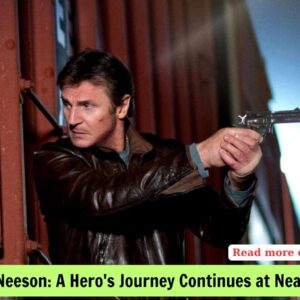On the occasion of his 100th film role, the Oscar nominee talks to IndieWire about everything from his favorite films, what he’s watching now, and the crazy role he’s taking on next.

Liam Neeson hasn’t kept count, but someone in the Open Road marketing department sure did: Marketing for Neil Jordan’s “Marlowe,” which casts the Oscar nominee as Raymond Chandler’s iconic gumshoe Philip Marlowe, note that the actor has reached the milestone of appearing in 100 films. If that’s not reason enough to speak to the 70-year-old Irish actor about the breadth of his cinematic career, what could possibly be?
(Due diligence: Neeson’s IMDb profile currently lists 139 acting roles, including voice work and TV shows, and as Neeson will remind us, documentaries. We did our own count, including TV movies, feature films, voice work, and cameos, and got to 99. We’ll take it.)
So: Over the course of 100 films (give or take), 45 years in the industry, and numerous awards, Neeson has portrayed real people (Alfred Kinsey to Oskar Schindler, Rob Roy to Mark Felt), iconic characters (from Gawain to Ra’s Al Ghul, Hannibal Smith to Aslan), transcended genre (“Love Actually” and “Star Wars”) — and at the end of it, became an AARP action-franchise hero in 2008 with “Taken.”
In celebration of all that — and, hell, with some just plain amusement — IndieWire spent some time with Neeson to chat about, as he would happily term them, the “little highs and lows” of a career that seems stronger than ever.
The following interview has been edited and condensed for clarity.
IndieWire: “Marlowe” is your 100th film.
Liam Neeson: So they tell me. There’s a few documentaries that I narrated in there as well.
Those count! When you hear “100 films,” what does that mean to you?
Two things, I guess: A, I’m certainly getting older and B, I’ve been incredibly lucky. That being said, I have created my own luck.
You must love working.
I do, because I still get a kick out of a bunch of strangers in some country who get financed together and offer me a script, guys and ladies that I’ve never met before in my life, that want me to be in their film.
What’s your first memory of being on a film set?
Well, kind of a big film would be “Excalibur” that we shot in Ireland in 1980. That was extraordinary, because it had Helen Mirren and Nicol Williamson — who is dead now, God rest his soul an extraordinary actor — there we are, all dressed in shining suits of armor and on horseback. It was like a dream come true, you know? Telling this Arthurian myth, this story that’s thousands of years old. It was just something.
And to be shooting it in Ireland, it was just great. John Boorman, who was the director, was a wonderful mentor to us, Gabriel Byrne, Ciaran Hinds, myself. He’d bring us behind the camera, show us what he’s looking at, give the reason why he’s shooting it this way, and just explaining what the camera does, the different ways he was going to shoot us.
 “Excalibur”©Orion Pictures Corp/Courtesy Everett Collection
“Excalibur”©Orion Pictures Corp/Courtesy Everett Collection
Do you have a favorite filming experience?
I feel like they’re all special, Kate. That doesn’t mean they’re all great movies. There’s been a few clunkers, but I’ve always carried away something. It’s usually about the crew on most of them. I love film crews, I really do. I’ve worked with some wonderful actors, of course, and that’s been great but movie crews, they’re a special breed.
I feel enriched, I really mean that, when I’m in their company. You get very close. After eight weeks, 10 weeks, you’re gone. I never say goodbye, I always say, “See you down the road.”
Was there a production that was particularly challenging for you?
I found “Schindler’s List” to be challenging for lots of reasons. “Schindler’s List” was emotionally pretty tough, for all of us.
“Darkman,” I did with Sam Raimi 32, 33 years ago, was very challenging, physically, because I was in the makeup chair for long, long, for many hours. I was also preparing for a bare-knuckle boxing film immediately after that. I was a lot younger, which helped, of course.
 “Darkman”©Universal/Courtesy Everett Collection
“Darkman”©Universal/Courtesy Everett Collection
Even 100 films in, there’s got to be stuff that you turned down. Was there a role or a film that you turned down that you now regret?
No. Strangely enough, that has never happened. There’s been a couple of movies I thought, “Oh, I was up for that,” but it’s better the way it turned out. A wonderful film, I loved the script, and that Robin Williams played, God rest him, was “Dead Poet’s Society.” I loved that script. Loved it. Robin was great. He was. That was the right casting.
Who are some of your favorite actors who you’ve acted alongside?
I’d say Jessica Lange, certainly. Meryl Streep was gorgeous to work with and I’m pleased to say she’s a pal. Bob De Niro, of course. Lesley Manville, extraordinary British actors. Danny Huston, who is in “Marlowe.” There’s so many.
I just did a day’s work on a film that Ethan Hawke is directing, with his daughter Maya playing the extraordinary American writer Flannery O’Connor [“Wildcat”]. I’m ashamed I’d never heard tell of her. I’m in the middle of reading her stuff. Ethan is — oh, I’d love to be directed by him in something bigger.
I was just in one scene with his daughter. I was playing an Irish priest — a stretch, I know. Maya, my gosh, what a talent. She’s an extraordinary young actress, let me tell you. It was just Maya and myself, and Maya is sick and she’s in a bed and I’m sitting at the side, and between takes, Ethan would come over and give her little notes. I tried not to listen. It’s a father and daughter, at the end of the day. But a couple of things I did hear, I thought, “That’s a great note. That’s a really good piece of direction.” That was last week — last Tuesday actually.
Oh, and Laura Linney! She’s an old pal, too. My God. She’s terrific. She plays Flannery O’Connor’s mom.
 “K-19: The Widowmaker”©Paramount/Courtesy Everett Collection
“K-19: The Widowmaker”©Paramount/Courtesy Everett Collection
Who are some of other favorite directors you’ve worked with?
Certainly Neil Jordan, we’ve done four films together, and we’re going to do a fifth hopefully toward the end of this year. Steven Spielberg is magnificent. He really is. He’s just fantastic. Peter Mullan, we’ve done two films.
I just wish there was more women directors. Kathryn Bigelow, I worked with a little over 20 years ago. [The film was 2002’s “K-19: The Widowmaker” opposite Harrison Ford.] She was terrific. I just wish there were more. In those hundred films, there was Kathryn and Angela Pope years ago. I did a film about AIDS for the BBC, [1998’s “Sweet As You Are,” part of the anthology “Screen Two”] and that’s been it. Two. I wish there were more, hopefully it’s starting to change.
Is there film that you’ve done that you thought should have done better? In terms of the critical response or the box office.
Maybe you can tell me.
Well, there is one film that doesn’t quite make the cut, it was well-reviewed and made over $80 million at the box office, but I feel like people don’t talk about it enough now, is “The Grey.” When we talk about all your action movies, that feels like the one I want people to talk about more.
Yes, I agree with you. It was a special film to shoot, too. Just personally, too. It was soon after the death of my wife [Natasha Richardson, who passed away in 2009]. I needed to do that film and when Joe Carnahan sent me the script, I thought, “This, I have to do. I have to do this to channel my grief, to channel something about what’s our fucking reason for being on this planet.”
It was a terrific experience. It was hard. It was a tough shoot, physically and all the rest, but being with those guys, those amazing actors. Frankie Grillo! And Joe. I thought I was in this great big safety net. They were all there helping me. You know what I mean? I was there to help them too, of course.
Oh, my God, we shot in the first week up in a place called Smithers. Very innocuous little name. Up in British Columbia. The cold. I never experienced cold like it.
I remember for this airplane crash scene, you kind of see what’s in the airplane, you see our breath and, then this incredibly, crystal clear shot of snow and sky. And I come up into frame like I had just woken up. When we were getting ready to shoot that, I was lying there and Noriko [Watanabe], my makeup lady, before Joe said ‘action,’ she just threw this crystal snow on my face. I was so surprised. It was like somebody throwing darts into your face. And when I sat up, the snow would fall away. She was absolutely right. That’s what would have happened!
 “The Grey”Open Road Films/Courtesy Everett Collection
“The Grey”Open Road Films/Courtesy Everett Collection
Everyone likes to talk about your renaissance as an action hero after “Taken,” but is there a film that, for you, spelled a turning point in your career?
Well, there’s always little highs and lows. I do remember reading that first “Taken” script. My wife was shooting a film with Ralph Fiennes in Shanghai and they were going to the Shanghai Film Festival to show the film and I went with Natasha, obviously. I knew Luc Besson was behind this “Taken” script, he was a co-writer and he was the head of the jury. I was hoping to meet him and I did. I said, “Look, Luc, I’m sure I’m not on even your long list of people, but would you consider me?”
Anyway, push came to shove, they offered me it. I remember thinking, “It’s going to go straight to video, it doesn’t matter, it’s just such a simple little story.” But it’s three months in Paris. How bad can that be? Working with these stunt guys every evening, I was in heaven. It was just a joy.
Then the film came out and did well in France first. Then it went to South Korea. Then I remember getting a couple calls from my nephews in Ireland, “Hi, Uncle Liam. We saw your film.” “What one was that?” “Uh, ‘Taken.’” I said, “You couldn’t have seen that. It’s not out yet.” “Oh, well, we downloaded it.” I thought, “Well, that’s the end of that.”
And then Fox took it in 2009 and they just did a really cool trailer, started showing it at sporting events and stuff. I think it opened at number two or number three and it sort of hovered there and went up and down a bit and then up a bit. It was great. [Laughs] This straight-to-video little movie! It’s nice to be proven wrong.
At this point, is there any kind of film that you haven’t done that you want to do?
I’m going to do it this year. It’ll either be the end of my so-called career or it’ll be another little avenue. We’re going to reboot the “Naked Gun” franchise. We’ll see. The script is being developed. It’s still very funny. There’s very funny stuff in it. They were all a series of gags. Do you remember “Airplane”?
Of course!
That was a series of gags, too. Peter Graves says to the kid, “You ever seen a grown man naked?” The stuff! You couldn’t get away with that shit now. Leslie Nielsen, his whole career changed when he comes into the cockpit on “Airplane.” Peter Graves is piloting the plane and Leslie comes in and gives him some information. Graves says, “Yeah, but surely, we’ve looked at that” or something. And Leslie Nielsen comes back in again and goes, “Don’t call me Shirley.” That was the moment, I’m telling you, that changed his life, his career.
What are some films you’ve watched recently that you’ve enjoyed?
Well, for a start, there’s what? There’s 200, 300 films that are Oscar-eligible, even with 24 hours in a day, you can’t see them all.
I did see a little film called “To Leslie.”
You’re on the “To Leslie” train?
Extraordinary actress! Andrea Riseborough. It reminded me of Truffaut, Cassavetes, a young Scorsese, like “Mean Streets.” I thought it was fucking magnificent. Truly.
Oh, “The Banshees of Inisherin.” I loved that. I laughed every minute. Someone asked me the other day, “Was there anything you didn’t like?” I said, “Yeah, Colin Farrell, he’s too handsome.” And he only gets better as an actor. I loved that film.
Do you know what I watched the other night? I kept avoiding it, I don’t know why. “Elvis.” Extraordinary. Baz Luhrmann, hello. I mean, to tell that history within the framework of American history, the civil rights movement, the death of Robert Kennedy, the death of John Kennedy. Those incredible Black musicians he found for the flashbacks to Elvis being a kid? Oh, my God.
I thought it was fantastic. I got a little bit worried when I saw Tom Hanks. I thought, “Oh no, oh please, this is taking me out of the film,” but for a very short time, a very short time. But he was wonderful. It was a wonderful performance. It really grew on me, that one. It’s a long film, two and a half hours or something. It was superb, really superb.
Thank you so much for taking the time, and congratulations.
See you down the road.
An Open Road and Briarcliff Entertainment release, “Marlowe” is in theaters now
News
“Liam Neeson’s Surprise: Shocking Appearance Raises Eyebrows on the Street”
Liam Neeson, 63 years old, famous actor with a series of roles in action movies: “Taken”, “Non-stop”… appeared thin and haggard on the streets of New York…
“Liam Neeson on Embracing Action Roles at 70: ‘I’m Getting Away with It’”
Liam Neeson is looking back at becoming an unlikely action star with 2008’s Taken Liam Neeson’s age isn’t getting in the way of his status as an action…
Liam Neeson refuses superhero movies, still acts in action movies
Although Liam Neeson has no plans to star in any more superhero movies, he said he will continue to participate in action movies. (Photo: The Playlist) Liam…
“Liam Neeson Delves into ‘Honest Thief’, Reflects on ‘Darkman’ Memories, and Addresses the Star Wars Reunion Rumors”
He also reveals which of his films he’d love to have revisited with a sequel. From writer/director Mark Williams (co-creator of the Netflix series Ozark), the crime drama Honest Thief tells the…
Liam Neeson’s action thriller suffers due to predictable twists, rushed ending
Liam Neeson’s Retribution is strictly a one-time watch for action star’s fans. However, a few of them might get disheartened as well. Liam Neeson’s films of late…
“Is ‘Made In Italy’ Worth the Watch? Analyzing Liam Neeson’s Movie Reviews and Rotten Tomatoes Scores”
The Liam Neeson movie Made In Italy is currently proving surprisingly popular on Netflix, but is this largely forgotten 2020 dramedy worth watching? SUMMARY Made In Italy…
End of content
No more pages to load






